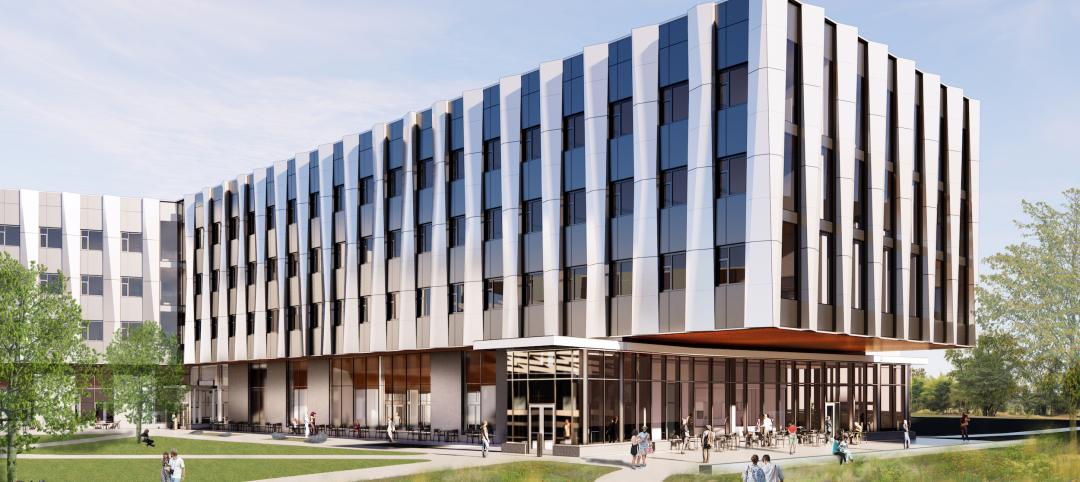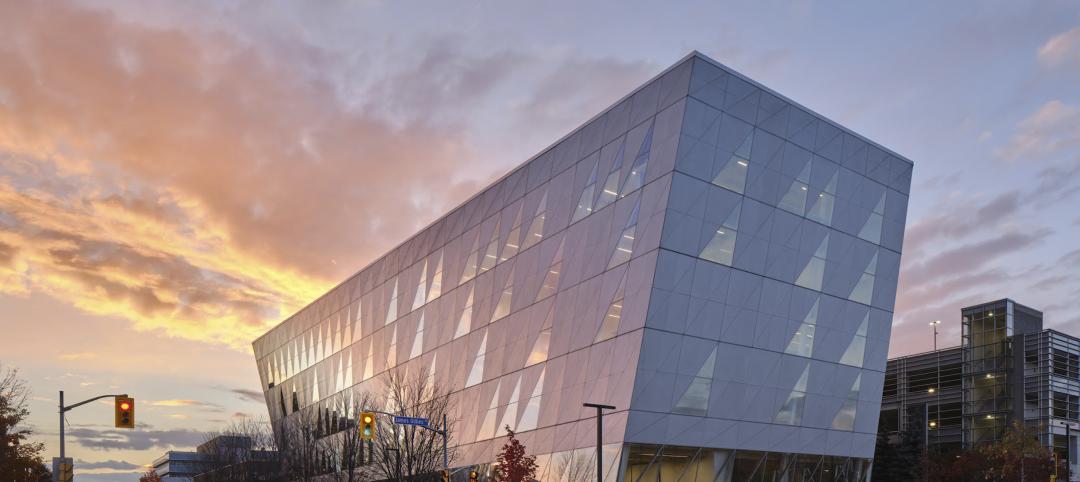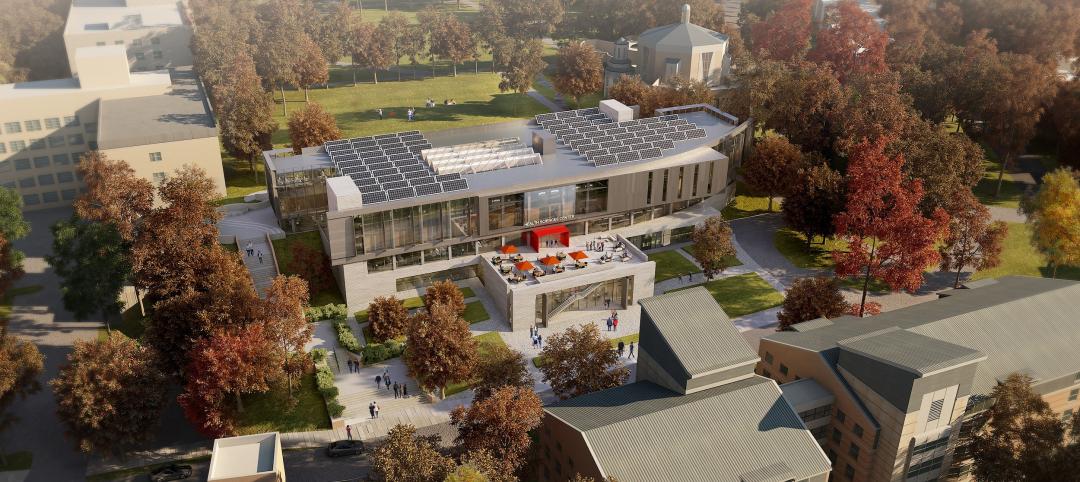Perkins and Will and Ryerson University have recently unveiled the new Daphne Cockwell Health Sciences Complex in downtown Toronto. The 28-story tower will connect students to the vibrancy of the city while also unifying Ryerson’s academic and residential functions.
Perkins and Will’s Toronto and Vancouver studios conceived the project as a vertical campus typology, the first of its kind for Ryerson University. The design adapts Toronto’s prevalent podium-tower model, lifting the building’s volumes to create an active streetscape and continuous public spaces from the ground level to the roof.
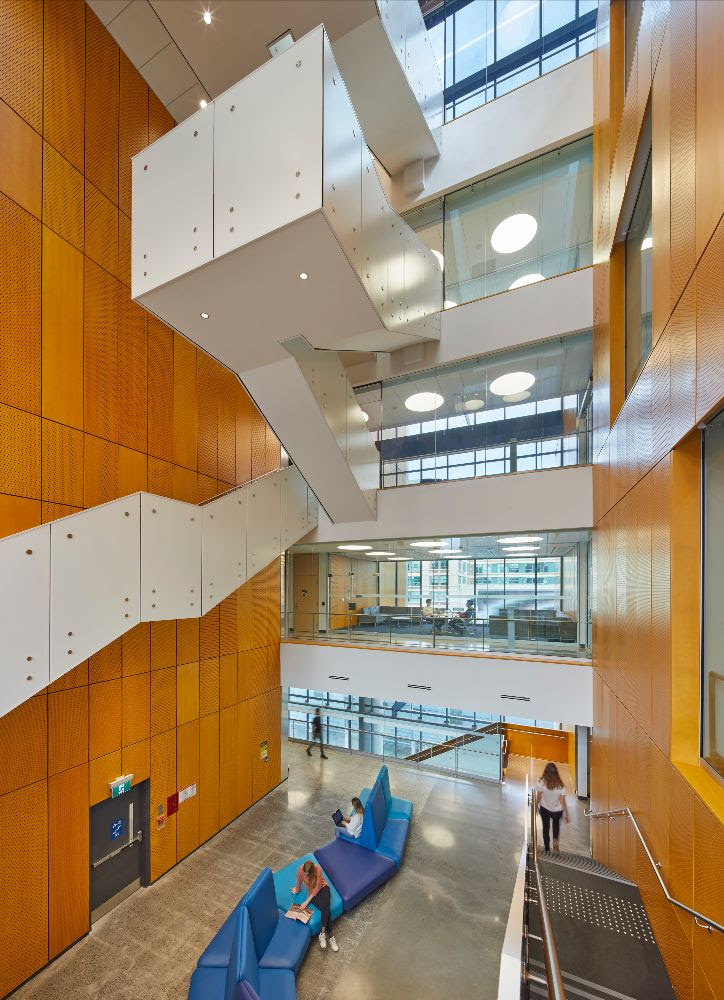
The nearly 300,000-sf building is located on the eastern edge of Ryerson’s campus and has become a new gateway into the campus from the east side. The building is clad in white aluminum panels and accented with orange. The orange threads visually represent the public spaces that are woven throughout the building, putting its activities on display.
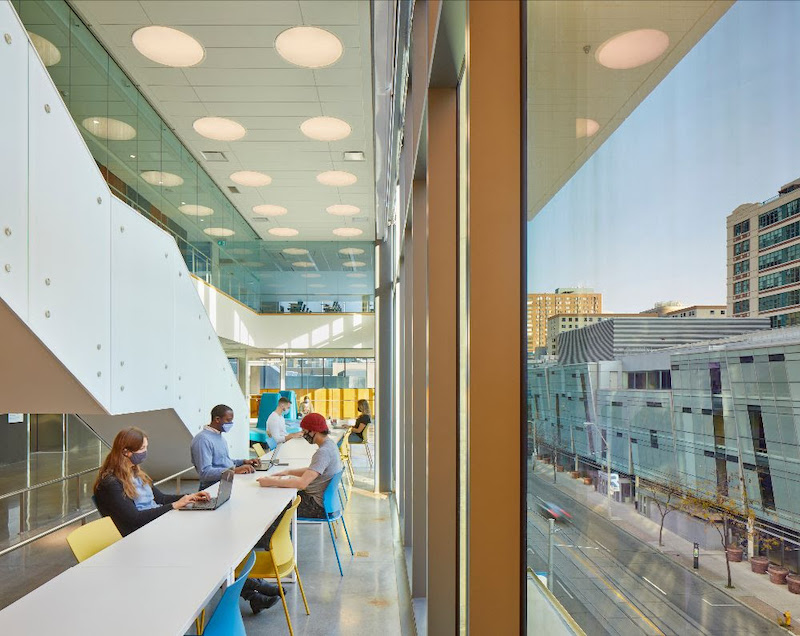
Four academic departments (Nursing, Midwifery, Nutrition, and Occupational and Public Health) are integrated within the first eight stories. The programs are supported by a variety of new classrooms, teaching kitchens, and labs. A Digital Fabrication lab, visible from the public realm, and flexible research facilities are also included. Residence dorms rise above 18 stories and house up to 330 students.
At pedestrian level a public atrium includes a cafe and spaces to socialize and study, creating new porosity with connections that link the city to the heart of the campus. Large windows help to create a seamless indoor-outdoor transition.
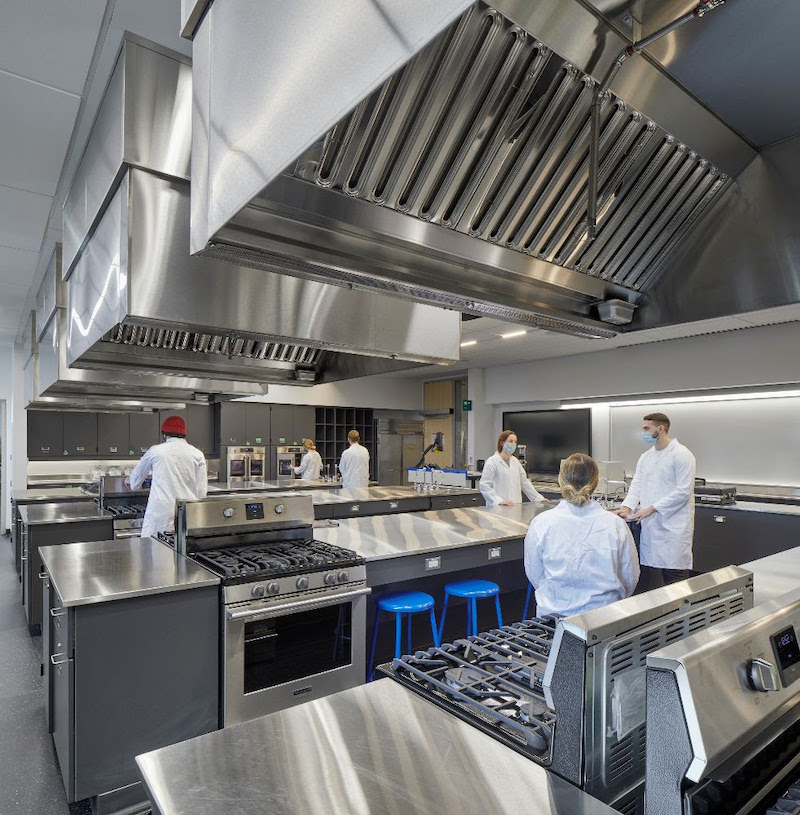
The Complex is also outfitted with machine-learning systems and sustainable technologies, such as a green roof that acts as an urban farm for the ground-floor cafe and a greywater system for faucets, toilets, and showers.
The Daphne Cockwell Health Sciences Complex was designed to achieve LEED Gold certification. It is expected to use 32% less energy and consume 35% less potable water than traditional construction. A metering and monitoring system allows the residence students to view their energy and water consumption online.
The building officially completed in 2019.
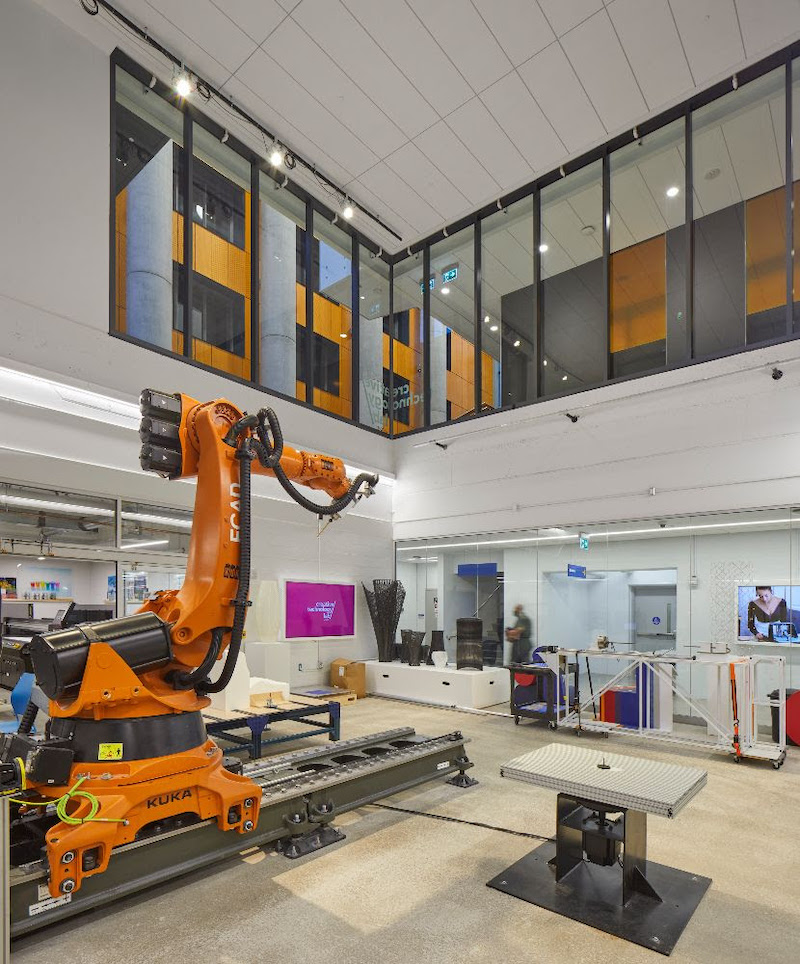
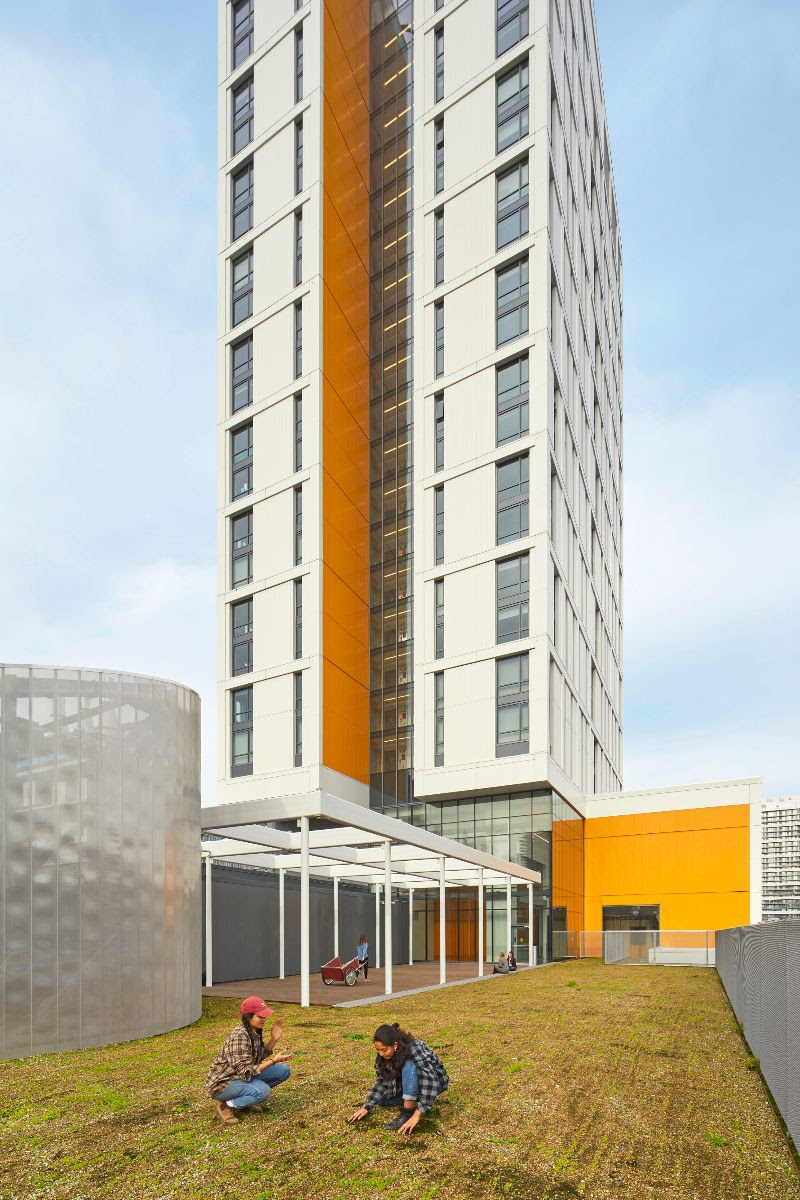
Related Stories
Higher Education | Jun 14, 2023
Designing higher education facilities without knowing the end users
A team of architects with Page offers five important factors to consider when designing spaces for multiple—and potentially changing—stakeholders.
University Buildings | Jun 9, 2023
Cornell’s new information science building will foster dynamic exchange of ideas and quiet, focused research
Construction recently began on Cornell University’s new 135,000-sf building for the Cornell Ann S. Bowers College of Computing and Information Science (Cornell Bowers CIS). The structure will bring together the departments of Computer Science, Information Science, and Statistics and Data Science for the first time in one complex.
Student Housing | Jun 5, 2023
The power of student engagement: How on-campus student housing can increase enrollment
Studies have confirmed that students are more likely to graduate when they live on campus, particularly when the on-campus experience encourages student learning and engagement, writes Design Collaborative's Nathan Woods, AIA.
Urban Planning | Jun 2, 2023
Designing a pedestrian-focused city in downtown Phoenix
What makes a city walkable? Shepley Bulfinch's Omar Bailey, AIA, LEED AP, NOMA, believes pedestrian focused cities benefit most when they're not only easy to navigate, but also create spaces where people can live, work, and play.
Higher Education | May 24, 2023
Designing spaces that promote enrollment
Alyson Mandeville, Higher Education Practice Leader, argues that colleges and universities need to shift their business model—with the help of designers.
University Buildings | May 17, 2023
New UC Irvine health sciences building supports aim to become national model for integrative health
The new College of Health Sciences Building and Nursing & Health Sciences Hall at the University of California Irvine supports the institution’s goal of becoming a national model for integrative health. The new 211,660-sf facility houses nursing, medical doctorate, pharmacy, philosophy, and public health programs in a single building.
University Buildings | May 11, 2023
New ‘bold and twisting’ building consolidates School of Continuing Studies at York University
The design of a new building that consolidates York University’s School of Continuing Studies into one location is a new architectural landmark at the Toronto school’s Keele Campus. “The design is emblematic of the school’s identity and culture, which is centered around accelerated professional growth in the face of a continuously evolving labor market,” according to a news release from Perkins&Will.
Sustainability | May 11, 2023
Let's build toward a circular economy
Eric Corey Freed, Director of Sustainability, CannonDesign, discusses the values of well-designed, regenerative buildings.
Digital Twin | May 8, 2023
What AEC professionals should know about digital twins
A growing number of AEC firms and building owners are finding value in implementing digital twins to unify design, construction, and operational data.
University Buildings | May 5, 2023
New health sciences center at St. John’s University will feature geothermal heating, cooling
The recently topped off St. Vincent Health Sciences Center at St. John’s University in New York City will feature impressive green features including geothermal heating and cooling along with an array of rooftop solar panels. The geothermal field consists of 66 wells drilled 499 feet below ground which will help to heat and cool the 70,000 sf structure.




